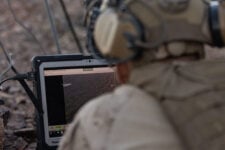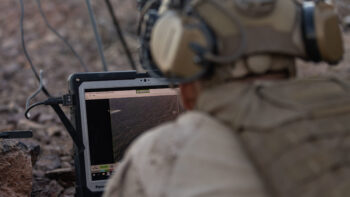
A banner depicting missiles and drones flying past a torn Israeli flag, with text in Persian reading “the next slap will be harder” and in Hebrew “your next mistake will be the end of your fake state”, hangs on the facade of a building in Palestine Square in Tehran on April 14, 2024. (ATTA KENARE/AFP via Getty Images)
WASHINGTON — After Israel and its partners batted down 300 Iranian munitions last night, President Joe Biden delivered a message to Israeli Prime Minister Benjamin Netanyahu: The “Israelis came out clearly, very much on top.”
“President [Biden] told the prime minister that Israel really came out far ahead in this exchange,” a senior administration official told reporters today. “Israel took out the IRGC Islamic Revolutionary Guards Corps leadership…. Iran responded, and Israel had clearly demonstrated its military superiority.”
It is not yet clear if and when Israel will respond to Iran’s Saturday attack, and the official stopped short of disclosing if the administration has urged Israel not to. But, the official said the US does “not envision ourselves participating in such a thing” — a clear signal that the Biden administration wants Netanyahu to take the win and not escalate further.
Until last night, Iran had not directly wadded directly into the war in Gaza between Israel and Hamas. Instead, Tehran relied on proxy groups (Hezbollah in both Lebanon and Iraq, plus Houthi forces in Sudan) to carry out attacks on Israel forces and backers like the United States. After a deadly drone strike on a US installation in Jordan in late January, attacks on US forces in the region, by and large, ceased, except for the volleys in the Red Sea.
But on April 1, Israel Defense Forces (IDF) struck an Iranian consulate in Damascus, Syria, killing seven IRGC officers and prompting Tehran’s retaliation.
Since that pivotal moment, the US has been working with Israel and other partners for what comes next, while also using Switzerland to ferry messages back and forth to Tehran. Despite that dialogue, Tehran did not disclose specific details about the strike, the official said today.
“I would not characterize it as if Iran gave us the time to prepare: Their intent was clearly to be highly, highly destructive,” the administration official added.
RELATED: Israel’s maritime C-Dome downs drone in first operational combat interception
In total, it is estimated that Iran and its proxies lobbed more than 300 aerial munitions towards Israel on Saturday night, including more than 150 one-way attack drones, 30 land-attack cruise missiles and 100 medium-range ballistic missiles.
Jordan, the United Kingdom and US all pitched in to defeat the barrage, with a senior US defense official broadly noting that the coordination was done at the military-to-military level.
The US estimates that the USS Arleigh Burke and USS Carney destroyed between four and six Iranian ballistic missiles, while a Patriot battery in Erbil, Iraq downed one ballistic missile. US aircraft in the region shot down more than 70 drones bound for Israel, according to a senior US military official.
Israel used Arrow 2 and 3 missiles to down a large number of the remaining ballistic missiles while they were over Israel and neighboring countries, that same military official said.
RELATED: Crowded waters: Who’s doing what in the international hotspot of the Red Sea
“Despite launching over 300 missiles from Iran, and other points in the region, Israel and a coalition partners are able to defeat 99% of these munitions: There’s virtually no infrastructure damage to Israel at all,” the senior administration official said.
UK Defence Secretary Grant Shapps announced on X, formally Twitter, that the UK intercepted and destroyed multiple one-way attack drones during the air campaign. In a subsequent announcement, Shapps noted UK is deploying additional Royal Air Force assets to the region, including air refueling tankers and RAF jets that will “intercept any airborne attacks within range of our existing missions.”
Will Congress Back Israel?
As the international community waits to see if that weekend attack could precipitate a larger, regional war, US lawmakers are grappling over military support for Israel, with multiple moving pieces.
First, there is the Biden administration’s $105 billion supplemental spending request that includes military aid for Ukraine and Israel that has been languishing on Capitol Hill for almost six months [PDF]. While the Senate has approved a version of the request, the House hasn’t followed suit, in part over concerns about providing additional dollars to Ukraine.
While the legislation does include military aid dollars for both countries, it also refills US military operation and maintenance coffers to pay for needed support in the region. For Israel alone, the request includes $4.4 billion. And while the lawmakers have not approved those additional funds, the US military has continued its regional support by taking funds out of hide.
Earlier this month, Army Under Secretary Gabe Camarillo pegged that figure at $800 million.
“We need that supplemental to reimburse us because that’s essentially operations funds that we cannot use for other things that we had planned to do during the course of the year,” he told an audience during an Association of the US Army breakfast.
“It impacts things like exercises that we had planned in Europe and in the Pacific, it effects, you know, operations activities at the unit level, that they want to do other areas where we have to take risks, because we’re cash flowing these costs,” he added.
It remains unclear if the House will act on the Senate-passed supplemental spending bill or try to separate out money for Israel and Ukraine, a move that could face opposition and take more time to clear both chambers.
Republican and Democratic lawmakers alike are using last night’s attack as a call for action.
House Majority Leader Steve Scalise, R-La., announced on X that the House will change up its legislative schedule next week and instead consider legislation to support Israel and hold Iran and proxies accountable. He did not disclose what those legislative vehicles would be but said, “more details…will be forthcoming.”
In his statement, House Speaker Rep. Mike Johnson, R-La., didn’t provide any additional insight on that plan but said the US must “show our full resolve to stand with our critical ally” and said he would “engage” with the White House on a “proper response.”
House Appropriations Committee Chairman Tom Cole, R-Okla., called for Congress to “continue to ensure Israel is equipped with the resources and capabilities needed to defend itself in full.” And Rep. Ken Calvert R-Calif., called on Congress to “immediately” pass a supplemental that provides additional supplies such as counter-unmanned aerial systems for both Israel and the US military in the region.
Many Democrats also used the attack on Iran to press for the supplemental’s passage. However, some inside the party have been raising concerns about the growing humanitarian crisis inside Gaza and indicating they are done waiting for a change in Israel’s tactics.
When asked during a recent CNN interview before today’s attack about whether the United States should impose conditions on military aid to Israel, Sen. Chris Coons, D-Del., said, “I think we’re at that point.”
Coons does not stand alone, Sen. Elizabeth Warren, D-Mass., has also called for Washington to stand up and enforce the laws on the books when it comes to weapons transfers (i.e., Foreign Assistance Act and Leahy Laws).
“Congress has responsibility here and I’m willing to take that responsibility,” she told CNN on April 4.
Australia tops up Ukraine military aid with $100M
Australia has already supplied Ukraine with 120 Bushmaster vehicles, six 155mm howitzers, 56 M113 armored vehicles, 14 special operations vehicles and its signature cardboard drones.



























